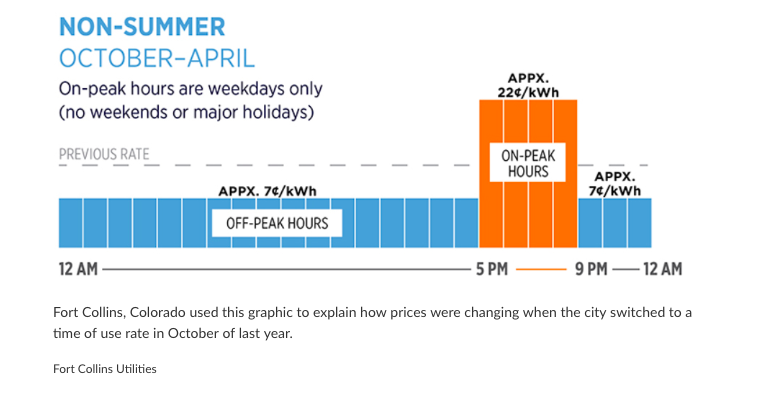States Consider Surge Pricing for Power
Will higher prices at peak times—like after the work day—prompt consumers to change their habits?
This story was originally published by Stateline, an initiative of The Pew Charitable Trusts.
Just as more people fly during the holidays and drive during rush hour, the demand for electricity peaks at predictable times.
Flights and some toll roads cost the most when demand is highest. Now California wants residents to get used to the same dynamic when it comes to purchasing electricity.
Starting in March, the state’s utility regulator will require major utilities to increase prices during the hours when electricity is in high demand and lower prices the rest of the time—a change that’s expected to affect some 6 million households.
It’s Uber’s surge pricing, but for your light switch.
Electricity might not feel like a hot commodity when you come home to an empty house at 5:30 p.m., but across California, millions of people also are returning from work, bumping down the thermostat a few degrees and throwing in a load of laundry before prepping dinner.
All that demand at once forces utilities to ramp up production, typically turning on additional generators that rely on fossil fuels. That costs utilities more, and it releases more dirty emissions.
Under the new policy, customers will be charged more for the electricity they use on weeknights between 4 p.m. and 9 p.m. and less during the rest of the day.
The California Public Utilities Commission hopes “time-of-use” pricing will push customers to adjust their lifestyles, reducing greenhouse gases as the state shrinks its reliance on such generators.
“By having a flat price throughout the day, we don’t signal to customers when those dirty generators are running,” said Beia Spiller, an economist with the Environmental Defense Fund, which supports time-of-use pricing. “You can’t capture this environmental cost that your consumption is putting on the system.”
Several smaller utilities scattered across the country have experimented with time-of-use pricing for residential customers, but California is the first to roll it out on such a grand scale.
The California Public Utilities Commission is requiring investor-owned utilities to make the switch, but some municipal utilities are doing so voluntarily. Electricity providers in San Diego and Sacramento will switch this spring, while the state’s largest utilities serving the Los Angeles and San Francisco areas will switch in 2020 after transitioning their billing software.
Some people may save money under the new system. Running the dishwasher late at night instead of right after dinner or doing laundry on the weekends could lower bills.
Massachusetts and Virginia also are considering legislation that would allow utilities to use time-of-use pricing. And individual utilities in states including Colorado, Tennessee and Arizona already use it.
Many of the programs are voluntary or, as in California, set time-of-use as their default pricing, but allow customers to opt out.
But opponents worry the new system will be too complicated or expensive for some residents, including people with disabilities, senior citizens and the poor.
State officials tried to address those concerns by exempting from the policy some 4 million customers who are enrolled in programs that provide bill assistance to low-income people and those reliant on medical devices.
But critics say not all customers will be savvy enough to know how to leave the program.
“It’s very clear that some folks will benefit from the time-of-use rate structure—there’s no question about that,” said Barbara Alexander, a Maine-based consumer affairs consultant on utilities issues. Wealthier people have the money to put timers on their swimming pool pumps and air conditioners, she said.
“But there are other customers,” she said, “who are maybe renting, who are low-income, who are working class, who have old appliances, and may not be financially, economically or even intellectually capable of monitoring their energy use on an hourly basis.”
Experiments in Other States
Simon Baker, the California Public Utilities Commission’s deputy energy division director, said that under surge pricing, customers who use electricity during off-peak hours, when it costs less for the utility to generate power, no longer subsidize those who use it at peak times, when generation costs more.
Fort Collins, Colorado, came to the same conclusion when it experimented with surge pricing in 2017. Lisa Rosintoski, deputy director of customer connections for Fort Collins Utilities, said off-peak users saved money on their bills, while peak users paid more.
About two-thirds of Fort Collins customers ended up with bills that were on average $2 higher, but 37 percent of customers saved an average of $6 per month. Overall electricity usage declined by 2.5 percent. Starting in October, the utility will make time-of-use pricing mandatory for all customers.
Fort Collins resident Robert Timme told the Coloradoan that time-of-use has prompted a significant change in how he consumes electricity.
“From 5 to 9 [p.m.], basically I want to shut it all down as much as I can without freezing the pipes,” he said.

In Tullahoma, Tennessee, time-of-use pricing has been mandatory for the utility’s 10,000 customers since 2013, when the Tennessee Valley Authority, which generates electricity for the utility, began charging more for electricity during peak hours.
Those who didn’t change their behavior saw about a 10 percent spike in their electric bills. For most customers in Tullahoma, that’s about $10 per month.
“Our management felt like, if you don’t change your behavior that’s fine, but you’re costing us more money on those peak hours,” said Brian Coate, vice president of electric and fiber systems for Tullahoma Utilities Authority.
‘Marketing Savvy’
Those who have helped roll out the new pricing emphasize the importance of educating the public.
“The biggest thing is having people understand what devices use the most energy,” Rosintoski said. “We had customers say, ‘Winter peak is 5 to 9, so I can’t make dinner,’ but your oven is not the biggest draw on energy. It’s your washer and dryer.”
Experts say it’s important to focus on what customers can do to save money rather than how prices are going up during certain hours.
“It requires a certain amount of marketing savvy,” said Ahmad Faruqui, an economist and principal with the Brattle Group, a financial consulting group, who has studied time-of-use pricing. “When Macy’s has a sale, they tell you when their clothes are 50 percent off. They don’t say, ‘Our prices are 200 percent higher’ on a regular day.”
But there are still many people who can’t make big shifts in their behavior, said Mark Toney, executive director of the Utility Reform Network, based in San Francisco, which advocates for inexpensive green energy. He said people are not always rational economic actors when it comes to high prices.
“If people acted in their economic self-interest, there wouldn’t be so many people broke, in debt and living paycheck to paycheck,” he said. Toney wants California to instead offer programs that give discounts and other incentives to people who cut their use during the peak rather than punishing those who do not.
Faruqui said some such programs have been successful in reducing use during the peak. But he doesn’t agree with Toney that time-of-use pricing will hurt some Californians.
“If their bill rises, they can just opt out of it,” he said. “It’s not mandatory.”
NEXT STORY: Cloud-based TMF projects ramping up





